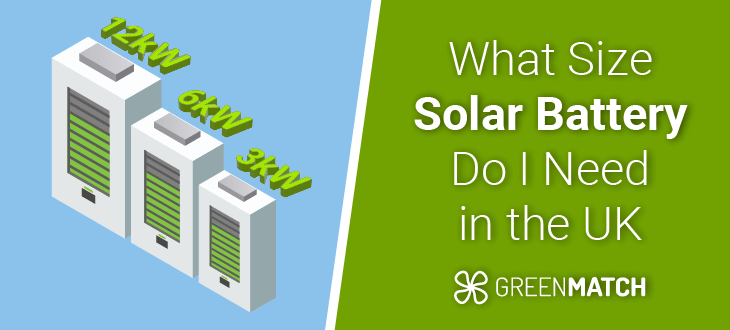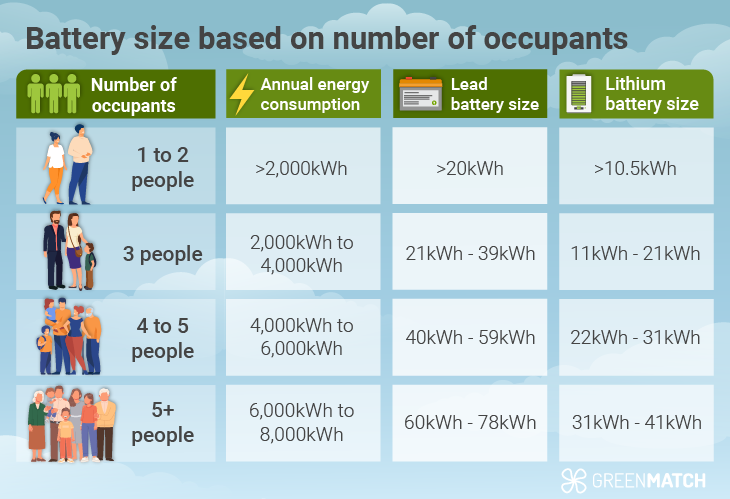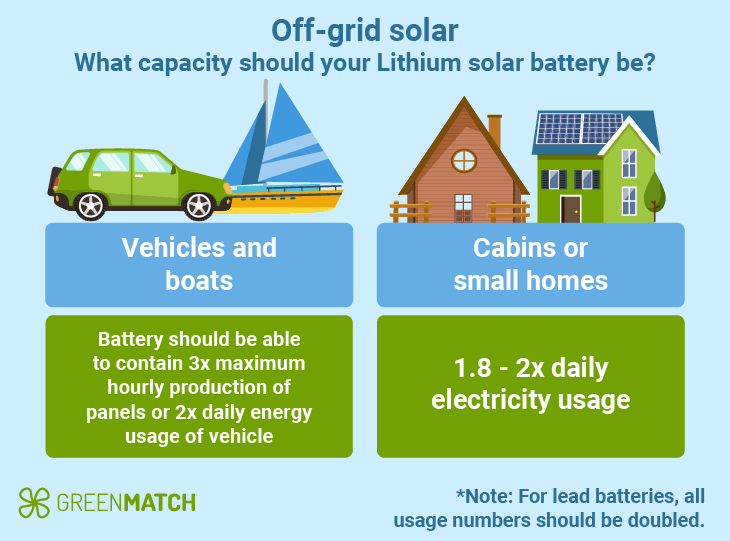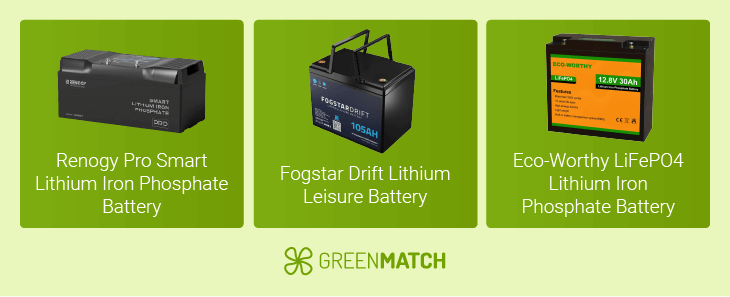Answer these simple questions and we will find you the BEST prices
Which type of solar quotes do you need?
It only takes 30 seconds
100% free with no obligation

Get up to 4 quotes by filling in only 1 quick form

Slash your energy bills by installing solar panels

For the average 2-3 bedroom house
- GreenMatch
- Solar Energy
- Solar Panels
- Solar Batteries
- What Size Solar Battery Do I Need
What Size Solar Battery Do I Need in the UK? (April 2025)


- The size of the solar battery you need is dependent on your energy consumption and the types of solar panels you have.
- The average UK household with a 4kW or 5kW solar system needs a 10 - 20kWh solar battery.
- An off-grid home or cabin would require a battery and solar array that can manage 1.8 to 2 times the daily electricity consumption in the building.
To make the most of your solar panel system, you will need a solar battery. However, finding the right size solar battery can be a crucial part of meeting your home’s energy needs along with matching your solar panels. If this seems complicated and you’re stuck wondering “What size battery do I need?”, we’re here to help.
The size of the solar battery you need will depend on how many people are in your household. Generally, you will need something between 10kWh and 20kWh for the average home.
| What Size Solar Battery Do I Need in the UK? | |
|---|---|
| Household size | Battery size (kWh) |
| 1-2 people | <10.5kWh |
| 2-3 people | 11-12kWh |
| 3-4 people | 13-20kWh |
| 4-5 people | 21-31kWh |
| 5+ people | 31+kWh |
From 1 Feb 2024, 0% VAT will apply to retrofitted residential solar batteries.
Residential battery storage systems are now exempt from VAT in the UK, whether installed new, retroactively, or alongside a solar panel system.
Previously, 0% VAT was only available for domestic solar batteries when installed with a new solar panel system.
- Quotes from local engineers
- Payment by finance available
- Save up to £1,110 per year
It only takes 30 seconds



- Solar battery sizing: size vs dimensions
- What size solar battery do you need for a UK household?
- Why is choosing the right solar battery size important?
- What size solar battery do you need when off grid?
- Can you choose more than one solar battery for your solar system?
- Choose the right solar battery size from local installers in the UK
- FAQ
Solar battery sizing: size vs dimensions
When talking about battery sizes, there is a crucial distinction between the dimensions (physical size of the battery) and size (its capacity). This is important to know going forward because these do not always positively correlate. While a large battery can be more powerful, this also depends on the materials it relies on and how efficiently the system is packed.
For example, when comparing a lead-acid battery and a lithium battery of the same size, the lithium battery most likely lasts longer. The latter is also more expensive but that is the price of higher performance. Similarly, different manufacturers have different systems and size may not be indicative of how they perform.
That’s why, when we talk about size, we refer to the various aspects related to how much energy it can store (max capacity, usable capacity, etc.) measured in kilowatt-hours (kWh). With that cleared, let’s get into solar battery sizes and how they relate to your household consumption.
What size solar battery do you need for a UK household?

The solar battery size you need will depend on how many people live in your home. The table below illustrates how many batteries to power a house in the UK in both lead and lithium categories.
| What size solar battery for UK households | |||
|---|---|---|---|
| Number of occupants | Annual energy consumption | Lead Battery Size | Lithium Battery Size |
| 1 to 2 people | <2,000kWh | <20kWh | <10.5kWh |
| 3 people | 2,000kWh to 4,000kWh | 21kWh - 39kWh | 11kWh - 21kWh |
| 4 to 5 people | 4,000kWh to 6,000kWh | 40kWh - 59kWh | 22kWh - 31kWh |
| 5+ people | 6,000kWh to 8,000kWh | 60kWh - 78kWh | 31kWh - 41kWh |
A single-bedroom house with an annual consumption lower than 2,000 kWh would require a lithium battery of 10.5kWh minimum or a lead acid battery of roughly 20kWh. Every additional 2,000kWh means adding 10 extra kWh to lithium batteries and roughly 20kWh to lead batteries.
Of course, finding the right battery can be a bit more complicated since these are average consumption levels. Many houses can exceed or underperform for various reasons. This is why the best way to get an estimate of the best solar battery for your situation is to contact an installer.
- Quotes from local engineers
- Payment by finance available
- Save up to £1,110 per year
It only takes 30 seconds



Why is choosing the right solar battery size important?
The right battery should have enough capacity for your needs so generally going larger is safer. However, too much capacity may mean you’re paying for more space than you need so it can be needlessly expensive.
At the same time, you should consider what you need the battery for. Having an oversized battery might come in handy if you want to charge external appliances like an electric car. On the other hand, buying smaller batteries can mean you can scale up later and add more when you need extra power.
Aside from the size of the battery, you should also consider the depth of discharge, capacity in series, and number of cycles the battery allows. You can learn more about sizes and other specs from our rundown of the best solar batteries.
What size solar battery do you need when off grid?

An off-grid solar battery needs to be sized depending on what you will be charging. For vehicles and boats, the calculation for lithium batteries is to either use 3 times the maximum hourly production or twice the daily usage of the vehicle (depending on which number is less).
When it comes to vehicles, the fact that they move means they won’t always be ideally placed for peak sunlight hours, which is why it’s good to be on the safe side by leaning towards higher capacity. The capacity for lead batteries should be doubled compared to that of lithium batteries.
For an off-grid cabin or small home, it’s best to have a battery and solar array that can handle at least 1.8 to 2 times the daily electricity consumption in the building. For example, if a cabin uses 4kWh of electricity daily, you’ll want at least a 3kW array, but this depends on whether that array can generate 7 to 8kWh daily during winter (since winter is when sunlight is at its lowest).
Best solar batteries for off-grid use

If you’re considering investing in a solar battery for your off-grid property, then it’s worth taking a look at some of the best options on the market today. These include:
- Renogy Pro Smart Lithium Iron Phosphate Battery: With its different capacity options, high depth of discharge at 80%, and its waterproof design, this battery is a great choice for any type of off-grid use. Additionally, this battery comes with a 7-year product and workmanship warranty, offering you peace of mind for years to come.
- Fogstar Drift Lithium Leisure Battery: This battery is suitable for a variety of energy needs, as it comes in different storage capacity sizes. It has a depth of discharge of 80% and user-friendly design that allows you to easily monitor your battery’s performance at any time. With its standard 10-year warranty, you can enjoy this reliable solar battery without any worries for years to come.
- Eco-Worthy LiFePO4 Lithium Iron Phosphate Battery: This lightweight and affordable solar battery is a great option for virtually any kind of off-grid use. While convenient and versatile, it’s good to know that it has a depth of discharge of up to 100%, which may have a negative impact on the battery’s lifespan. At the same time, it comes with a warranty period of only 2 years, so be sure to consider whether this option is suitable for you.
It’s important to note that off-grid systems require solar panels to be matched to both the battery and the needs of the home or vehicle. To determine what size battery for your solar panels would be most appropriate, you’ll need to understand your energy production. You can learn more about different sizes of solar panel systems from the various pages below:
- 1kW solar system
- 2kW solar system
- 3kW solar system
- 4kW solar system
- 5kW solar system
- 10kW solar system
- 12kW solar system
Can you choose more than one solar battery for your solar system?
Most solar batteries come with the ability to connect them in series. This can depend on the model and the manufacturer but most of them have this option. However, how many you can connect in a series can differ from battery to battery.
Additionally, “How much battery storage do I need?” is not the only question you should be asking as other factors also play a role. There are some things worth considering when looking for a solar battery you might want to connect in series:
- Always check the maximum capacity in series. Batteries cannot be connected endlessly so it’s worth knowing the exact number. The Tesla Powerwall 2 is quite good as you can chain 10 batteries together for a total capacity of 135kWh to 140kWh.
- Choose the battery chemistry, manufacturer, and model carefully. Once you pick one, you should connect the same type of battery to others like it. This keeps the energy storage optimal.
- Make sure the storage systems have the same voltage. This ensures safety, longevity, and compatibility.
- Batteries can be exclusive to certain types of solar panels. Check for compatibility before you buy. Many manufacturers also lock their batteries to only work with their systems so be weary of this.
Choose the right solar battery size from local installers in the UK
With all the advice listed above, keep one thing in mind: there’s only so much we can help you without knowing the specifics of your system, your needs, and your home. That’s why the best way to find the ideal solar panel battery size is to ask an installer. Not only can they offer you their services, but they can also help you answer this important question: "Are solar batteries worth it?"
- Quotes from local engineers
- Payment by finance available
- Save up to £1,110 per year
It only takes 30 seconds



FAQ
For a 3-bedroom house in the UK, you will need a lithium solar battery with a capacity between 11kWh – 21kWh. This varies depending on your household size and consumption.
5kW solar batteries are too small to power a house but could be handy for appliances or motor homes. It may not be enough for a house but may work for certain off-grid applications.
What size solar battery you need is determined by your home’s energy consumption.
A 10kW solar battery may be enough to power a single-bedroom flat, given that it’s a lithium battery. Larger homes may need more powerful models depending on their energy needs.

Rawal Ahmed is a writer at GreenMatch with an interest in sustainability and a background in tech journalism and digital marketing.
We strive to connect our customers with the right product and supplier. Would you like to be part of GreenMatch?

- Solar battery sizing: size vs dimensions
- What size solar battery do you need for a UK household?
- Why is choosing the right solar battery size important?
- What size solar battery do you need when off grid?
- Can you choose more than one solar battery for your solar system?
- Choose the right solar battery size from local installers in the UK
- FAQ
